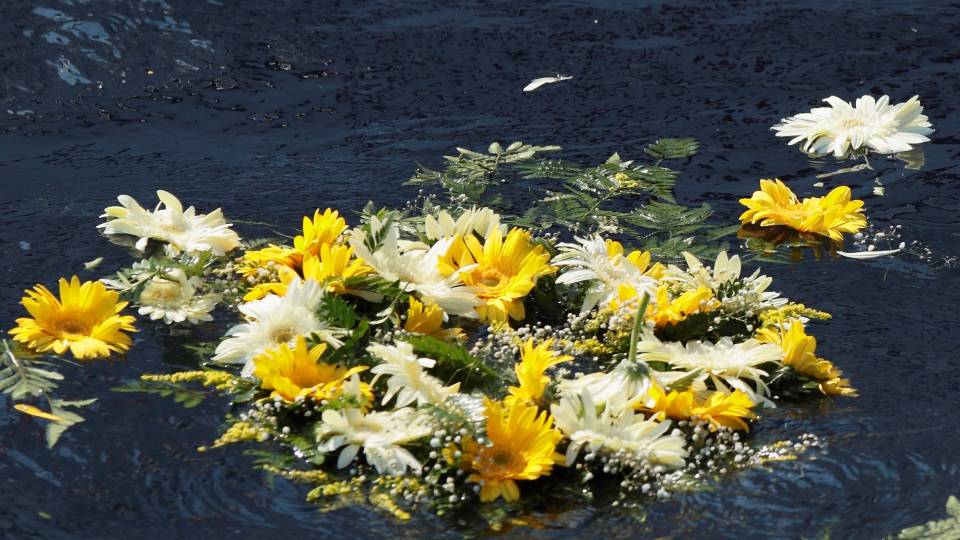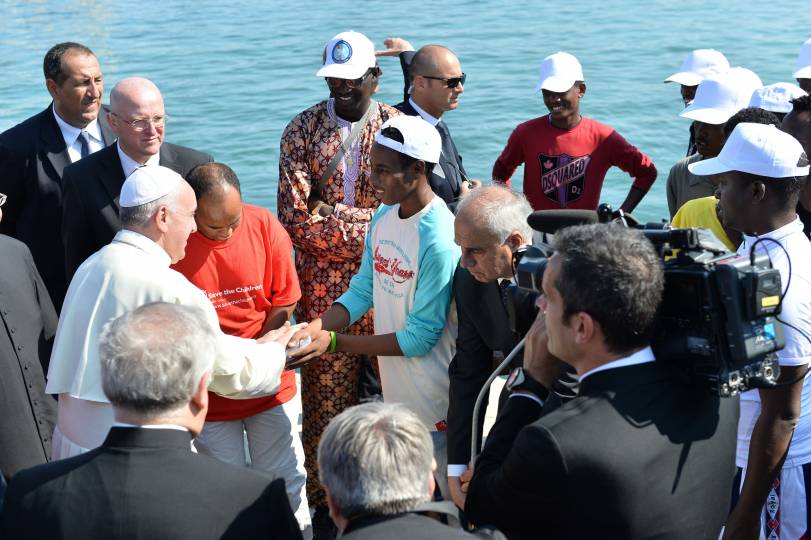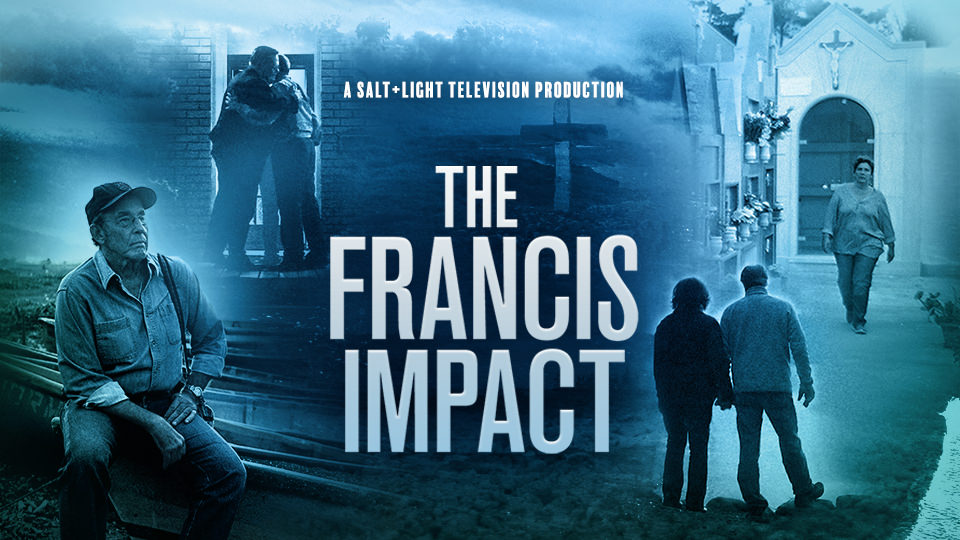Six years ago today, Francis shook humanity’s conscience
Sebastian Gomes
Monday, July 8, 2019


Homily of Pope Francis in Lampedusa on July 8, 2013: Immigrants dying at sea, in boats which were vehicles of hope and became vehicles of death. That is how the headlines put it. When I first heard of this tragedy a few weeks ago, and realized that it happens all too frequently, it has constantly come back to me like a painful thorn in my heart. So I felt that I had to come here today, to pray and to offer a sign of my closeness, but also to challenge our consciences lest this tragedy be repeated. Please, let it not be repeated! First, however, I want to say a word of heartfelt gratitude and encouragement to you, the people of Lampedusa and Linosa, and to the various associations, volunteers and security personnel who continue to attend to the needs of people journeying towards a better future. You are so few, and yet you offer an example of solidarity! Thank you! I also thank Archbishop Francesco Montenegro for all his help, his efforts and his close pastoral care. I offer a cordial greeting to Mayor Giusi Nicolini: thank you so much for what you have done and are doing. I also think with affection of those Muslim immigrants who this evening begin the fast of Ramadan, which I trust will bear abundant spiritual fruit. The Church is at your side as you seek a more dignified life for yourselves and your families. To all of you: o’scià! This morning, in the light of God’s word which has just been proclaimed, I wish to offer some thoughts meant to challenge people’s consciences and lead them to reflection and a concrete change of heart. "Adam, where are you?" This is the first question which God asks man after his sin. "Adam, where are you?" Adam lost his bearings, his place in creation, because he thought he could be powerful, able to control everything, to be God. Harmony was lost; man erred and this error occurs over and over again also in relationships with others. "The other" is no longer a brother or sister to be loved, but simply someone who disturbs my life and my comfort. God asks a second question: "Cain, where is your brother?" The illusion of being powerful, of being as great as God, even of being God himself, leads to a whole series of errors, a chain of death, even to the spilling of a brother’s blood! God’s two questions echo even today, as forcefully as ever! How many of us, myself included, have lost our bearings; we are no longer attentive to the world in which we live; we don’t care; we don’t protect what God created for everyone, and we end up unable even to care for one another! And when humanity as a whole loses its bearings, it results in tragedies like the one we have witnessed. "Where is your brother?" His blood cries out to me, says the Lord. This is not a question directed to others; it is a question directed to me, to you, to each of us. These brothers and sisters of ours were trying to escape difficult situations to find some serenity and peace; they were looking for a better place for themselves and their families, but instead they found death. How often do such people fail to find understanding, fail to find acceptance, fail to find solidarity. And their cry rises up to God! Once again I thank you, the people of Lampedusa, for your solidarity. I recently listened to one of these brothers of ours. Before arriving here, he and the others were at the mercy of traffickers, people who exploit the poverty of others, people who live off the misery of others. How much these people have suffered! Some of them never made it here. "Where is your brother?" Who is responsible for this blood? In Spanish literature we have a comedy of Lope de Vega which tells how the people of the town of Fuente Ovejuna kill their governor because he is a tyrant. They do it in such a way that no one knows who the actual killer is. So when the royal judge asks: "Who killed the governor?", they all reply: "Fuente Ovejuna, sir". Everybody and nobody! Today too, the question has to be asked: Who is responsible for the blood of these brothers and sisters of ours? Nobody! That is our answer: It isn’t me; I don’t have anything to do with it; it must be someone else, but certainly not me. Yet God is asking each of us: "Where is the blood of your brother which cries out to me?" Today no one in our world feels responsible; we have lost a sense of responsibility for our brothers and sisters. We have fallen into the hypocrisy of the priest and the levite whom Jesus described in the parable of the Good Samaritan: we see our brother half dead on the side of the road, and perhaps we say to ourselves: "poor soul…!", and then go on our way. It’s not our responsibility, and with that we feel reassured, assuaged. The culture of comfort, which makes us think only of ourselves, makes us insensitive to the cries of other people, makes us live in soap bubbles which, however lovely, are insubstantial; they offer a fleeting and empty illusion which results in indifference to others; indeed, it even leads to the globalization of indifference. In this globalized world, we have fallen into globalized indifference. We have become used to the suffering of others: it doesn’t affect me; it doesn’t concern me; it’s none of my business! Here we can think of Manzoni’s character – "the Unnamed". The globalization of indifference makes us all "unnamed", responsible, yet nameless and faceless. "Adam, where are you?" "Where is your brother?" These are the two questions which God asks at the dawn of human history, and which he also asks each man and woman in our own day, which he also asks us. But I would like us to ask a third question: "Has any one of us wept because of this situation and others like it?" Has any one of us grieved for the death of these brothers and sisters? Has any one of us wept for these persons who were on the boat? For the young mothers carrying their babies? For these men who were looking for a means of supporting their families? We are a society which has forgotten how to weep, how to experience compassion – "suffering with" others: the globalization of indifference has taken from us the ability to weep! In the Gospel we have heard the crying, the wailing, the great lamentation: "Rachel weeps for her children… because they are no more". Herod sowed death to protect his own comfort, his own soap bubble. And so it continues… Let us ask the Lord to remove the part of Herod that lurks in our hearts; let us ask the Lord for the grace to weep over our indifference, to weep over the cruelty of our world, of our own hearts, and of all those who in anonymity make social and economic decisions which open the door to tragic situations like this. "Has any one wept?" Today has anyone wept in our world? Lord, in this liturgy, a penitential liturgy, we beg forgiveness for our indifference to so many of our brothers and sisters. Father, we ask your pardon for those who are complacent and closed amid comforts which have deadened their hearts; we beg your forgiveness for those who by their decisions on the global level have created situations that lead to these tragedies. Forgive us, Lord! Today too, Lord, we hear you asking: "Adam, where are you?" "Where is the blood of your brother?" Text courtesy of Libreria Editrice Vaticana (click here for the original source)
Watch The Francis Impact – available only on Salt + Light TV!
Next broadcast dates:
Sunday, July 14 at 9 pm ET / 6 pm PT Saturday, July 20 at 9 pm ET / 6 pm PT
For more on the film, including a full-length trailer, behind-the-scenes photos, and our special #TFIMOMENTS, visit the official webpage.

Related Articles:
Category: Saints and Blesseds
Tag: "Telling them apart", St. James
Pope’s General Audience – February 5, 2025
Wednesday, February 5, 2025
 Pope Francis
Pope Francis
In his Wednesday General Audience, Pope Francis continued this cycle of catechesis on "Jesus Christ our Hope," as part of the Jubilee 2025. This week he reflected on the Magnificat, the Virgin Mary's Song of Praise after she is greeted by her cousin Elizabeth.
Pope’s General Audience – January 29, 2025
Wednesday, January 29, 2025
 Pope Francis
Pope Francis
Reflecting on the vision given to St. Joseph in the Gospel of Matthew, Pope Francis said that "He dreams of the miracle that God fulfils in Mary’s life, and also the miracle that he works in his own life: to take on a fatherhood capable of guarding, protecting, and passing on a material and spiritual inheritance."
Pope’s General Audience – January 22, 2025
Wednesday, January 22, 2025
 Pope Francis
Pope Francis
Pope Francis continued this cycle of catechesis on "Jesus Christ our Hope." Reflecting on the Angel Gabriel's greeting to the Virgin Mary at the Annunciation, he said that "The 'Almighty,' the God of the 'impossible' is with Mary, together with and beside her; He is her companion, her principal ally, the eternal 'I-with-you.'"
Pope’s General Audience – November 27, 2024
Wednesday, November 27, 2024
 Pope Francis
Pope Francis
In his weekly catechesis, Pope Francis reflected on the fruits of the Spirit. Beginning with Joy, he said that "not only is it not subject to the inevitable wear of time, but it multiplies when it is shared with others! A true joy is shared with others; it even spreads."
Pope’s General Audience – November 13, 2024
Wednesday, November 13, 2024
 Pope Francis
Pope Francis
In his weekly catechesis, Pope Francis reflected on how the Holy Spirit empowered the Blessed Virgin Mary to become the Mother of God.













